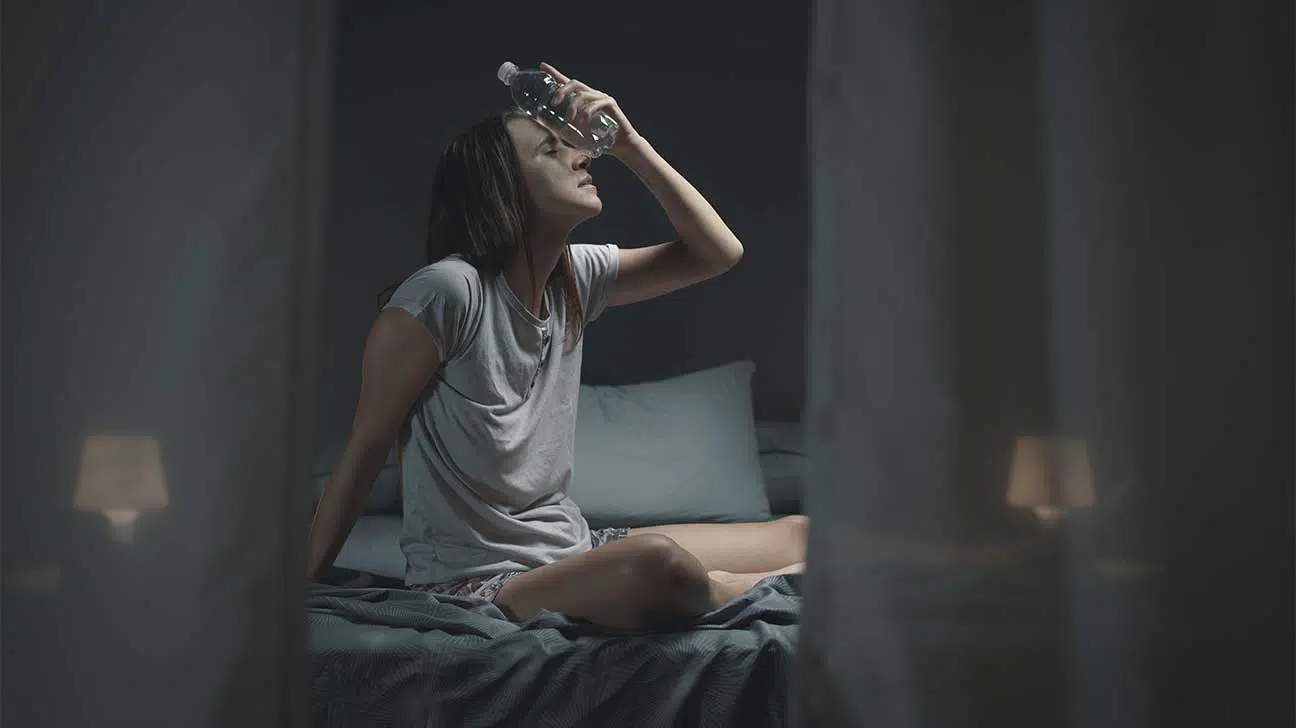
Sweating is a common side effect of alcohol detoxification and a symptom of alcohol withdrawal syndrome. Although uncomfortable, this symptom is generally temporary.
Night sweats, and similar side effects such as flushing and high body temperature, may last the duration of acute withdrawal. This lasts five to seven days on average.
If you or a loved one is experiencing night sweats during or after detox programs, consider seeking an alcohol rehab program or medical provider for further guidance.
What Causes Night Sweats During Alcohol Detox?
Night sweats can be a side effect of alcohol consumption, alcohol intolerance, or alcohol withdrawal, largely because alcohol affects the central nervous system.
The central nervous system (CNS) helps to regulate body temperature, blood pressure, and heart function. Alcohol, and alcohol withdrawal, can disrupt normal CNS activity.
Furthermore, night sweats can also be influenced by factors such as the use of certain medications (e.g. steroids, antidepressants), menopause, and other health conditions.
Other Possible Sleep Disturbances During Alcohol Detox
There are several common signs of alcohol withdrawal that can disrupt a person’s sleep and cause physical discomfort after their last drink during the detox process.
Common side effects of alcohol detox include:
- daytime sweating
- hot flashes
- goosebumps
- chills
- insomnia
- high body temperature
- anxiety
Fever can also occur during alcohol detox, although this is a more serious side effect that can be a sign of a life-threatening form of withdrawal known as delirium tremens (DTs).
Are Night Sweats Dangerous During Alcohol Detox?
Night sweats aren’t inherently a sign of danger. Excessive sweating, however, may contribute to dehydration in conjunction with symptoms like vomiting and diarrhea.
Excessive sweating can also be a sign of certain medical conditions, a mental health issue such as anxiety, and severe alcohol withdrawal syndrome.
Signs of severe alcohol withdrawal include:
- very rapid heart rate
- abnormal heart rhythm
- confusion
- agitation
- seizures
- high blood pressure
- hallucinations
Alcohol withdrawal symptoms can be safely and effectively managed within an inpatient detox environment, such as a detox facility or addiction treatment center.
Managing Night Sweats During Alcohol Detox
Night sweats during detoxification may not be avoidable. However, there are ways that you can help reduce its intensity and the discomfort it may cause.
Tips for managing night sweats include:
- staying hydrated by drinking plenty of water
- avoid using very heavy blankets
- change your sheets regularly while detoxing
- keep your bedroom at a reasonable temperature
- showering to remove excess salt from the skin
- wearing light clothes to bed
Anyone who is alcohol-dependent and undergoing withdrawal should seek medical advice from a healthcare provider prior to attempting alcohol detox at home.
While night sweats are not one of the more serious symptoms of alcohol withdrawal, alcohol dependence may require additional treatment from a substance use treatment provider.
Night Sweats And Alcohol FAQs
Find answers to common questions about how alcohol causes night sweats during withdrawal, how long they last, and alcohol abuse treatment options.
Are Night Sweats Normal After You Stop Drinking Alcohol?
Night sweats are a common sign of alcohol withdrawal, which is a condition that can develop when a person with alcohol dependency stops drinking alcohol.
Does Alcohol Contribute To Night Sweats?
Alcohol can contribute to sweating due to its effects on the circulatory and central nervous systems.
Consuming alcohol can speed up heart activity, which in turn can lead to dilated blood vessels and symptoms such as flushed skin, warmness, and sweating.
What Are Symptoms Of Night Sweats During Alcohol Detox?
Night sweats can generally be described as unusual or excessive sweating during the night hours.
This may be accompanied by additional symptoms such as:
- high body temperature
- flushed skin
- hot flashes
- difficulty falling or staying asleep
- restlessness
Additional contributors that can cause you to experience night sweats include the use of certain prescription drugs, low blood sugar, and other alcohol withdrawal symptoms.
Find Substance Abuse Treatment Today
For more information about substance use disorder treatment, contact our team at AddictionResource.net today.
For more information about alcohol detox and how to find an alcohol detox program near you, call our helpline to connect with one of our staff members today.
Addiction Resource aims to provide only the most current, accurate information in regards to addiction and addiction treatment, which means we only reference the most credible sources available.
These include peer-reviewed journals, government entities and academic institutions, and leaders in addiction healthcare and advocacy. Learn more about how we safeguard our content by viewing our editorial policy.
- U.S. National Library of Medicine: MedlinePlus — Alcohol Withdrawal
https://medlineplus.gov/ency/article/000764.htm - University of Michigan Health: Michigan Medicine — Night Sweats
https://www.uofmhealth.org/health-library/abq4491 - U.S. National Institute on Alcoholism and Alcohol Abuse (NIAAA) — Complications of Alcohol Withdrawal
https://pubs.niaaa.nih.gov/publications/arh22-1/61-66.pdf


